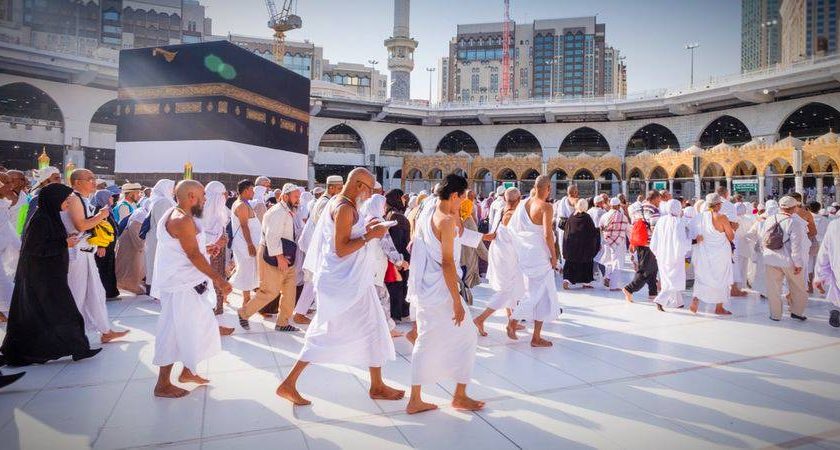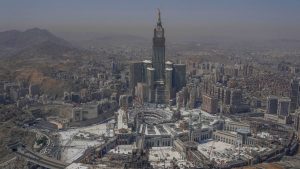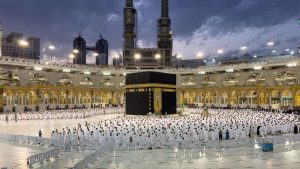Hajj is a sacred journey for Muslims, bringing millions together in Makkah each year. It is important to consider how we can make this pilgrimage more sustainable and environmentally friendly.
Understanding the Environmental Impact
The large number of pilgrims during Hajj leads to significant environmental challenges:
- Waste Generation: Pilgrims produce large amounts of waste including plastic bottles, food packaging and other disposable items. For example in 2019 over 1 million livestock were prepared for meat sacrifice to cater to Hajj pilgrims which lead to substantial waste.
- Water Consumption: Hajj requires significant water usage for ablution, sanitation and hydration purposes.The excessive demand for water during the pilgrimage puts a strain on local water resources especially in the arid region of Makkah.
- Energy Use: Transportation of pilgrims via airplanes and other means contributes to greenhouse gas emissions impact the environment.
Simple Steps for a Sustainable Hajj
For Hajj 2025 here are some straightforward actions pilgrims can take to reduce their environmental footprint:
- Reduce Waste:
- Use reusable water bottles to cut down on plastic waste.
- Opt for eco-friendly packaging materials when distributing meat during Qurbani.
- Dispose of waste responsibly by using designated bins and recycling when possible.
- Conserve Water:
- Be mindful of water usage during ablutions and other activities.
- Report any water leakages to authorities to prevent wastage.
- Save Energy:
- Turn off lights and electrical appliances when not in use.
- Use energy-efficient devices to minimize electricity consumption.
- Choose Sustainable Hajj Packages:
- Select Hajj packages that prioritize eco-friendly accommodations and transportation options.
- Support travel platforms like Hajj Companions that offer sustainable travel options to reduce the overall environmental impact.
The Role of Hajj Packages in Sustainability
Travel agencies play a important role in promoting sustainable practices during Hajj. By offering Hajj packages that include eco-friendly accommodations, transportation and waste management services they can significantly reduce the environmental impact of the Hajj. Pilgrims are encouraged to choose packages that align with sustainable practices to contribute to a greener Hajj experience.
Frequently Asked Questions
- When is Hajj 2025?
Hajj 2025 is expected to occur between Friday, August 1, 2025 and Wednesday, August 6 2025.
- What are the environmental impacts of Hajj?
Hajj contributes to waste generation, high water consumption and significant energy use which can lead to environmental challenges.
- How can pilgrims reduce waste during Hajj?
Pilgrims can use reusable water bottles, choose eco-friendly packaging for meat distribution and dispose of waste responsibly by using designated bins and recycling when possible.
- Why is water conservation important during Hajj?
Conserving water is crucial to prevent wastage especially in the arid region of Makkah where water resources are limited.
- What are sustainable Hajj packages?
Sustainable Hajj packages prioritize eco-friendly accommodations, transportation and waste management services to reduce the environmental impact of the pilgrimage.
- How can travel agencies promote sustainability during Hajj?
By offering packages that include eco-friendly accommodations, transportation and waste management services travel agencies can significantly reduce the environmental impact of Hajj.
- What is the significance of Hajj in Islam?
Hajj is one of the Five Pillars of Islam. Hajj represents unity, equality and submission to Allah.
- What are the main rituals of Hajj?
The main rituals include Ihram (state of purity), Tawaf (circling the Kaaba), Sa’ee (walking between Safa and Marwah), standing at Arafat and the symbolic stoning of the Shaitan (Satan) at Mina.
- Is there an age limit for performing Hajj?
The minimum age for Hajj is 12 years with no upper age limit.
Key Takeaways
- Environmental Impact: Hajj has significant environmental effects including waste generation, high water consumption and energy use.
- Sustainable Practices: Pilgrims can adopt simple actions like using reusable water bottles, conserving water and choosing sustainable Hajj packages to reduce their environmental footprint.
- Role of Travel Agencies: Travel agencies can promote sustainability by offering eco-friendly accommodations, transportation and waste management services.
- Significance of Hajj: Hajj is a fundamental pillar of Islam, symbolizing unity, equality and submission to Allah.
- Rituals of Hajj: he main rituals include Ihram, Tawaf, Sa’ee, standing at Arafat and the symbolic stoning of the Shaitan (Satan) at Mina.
- Age Requirements: he minimum age for Hajj is 12 years with no upper age limit.
Tailpiece
For Hajj 2025 and future Hajj adopting sustainable practices is essential to preserve the environment for future generations. By making conscious choices and supporting eco-friendly initiatives we can ensure that our spiritual journey also honors our responsibility as stewards of the Earth. May your journey of Hajj 2025 be as fulfilling and rewarding as you wish it to be. Ameen!










